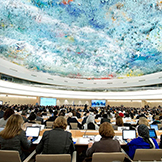Clustered ID on HRDs and Torture Statement of Ireland
Clustered Interactive Dialogue with the Special Rapporteur on the situation of human rights defenders and the Special Rapporteur on torture and other cruel, inhuman or degrading treatment or punishment
Statement of Ireland
2 March 2017
Ireland aligns itself with the statement of the European Union and adds the following.
Mr President
Ireland warmly welcomes the report of the Special Rapporteur on Human Rights Defenders and thanks him for the work carried out over the past three years.
Countless women, men and indeed children work, in all regions of the world, to promote and protect human rights. They often do so at great personal cost. But human rights defenders need more than our admiration. They need and deserve our active support and protection. At a time when threats, intimidation and concerted attacks against human rights defenders remain all too common, Ireland considers it vital that the Council this session renew the mandate of the Special Rapporteur on the situation of Human Rights Defenders.
We recall that facilitating human rights defenders in carrying out their work has a protective effect for all rights and for all rights-holders. In short, the stubborn persistence of threats to human rights defenders must be met with an equally stubborn persistence on our part, to continue to vigorously defend human rights defenders and raise greater awareness and understanding of the applicable international law and standards.
Ireland welcomes the fact that the Special Rapporteur was in a position to carry out three country visits in 2016, namely to Australia, Azerbaijan and Hungary. We note with particular concern the conclusion of the Special Rapporteur that human rights defenders are increasingly at risk in Azerbaijan and operate in a criminalised and heavily constrained environment. We urge Azerbaijan to avail of the advisory support offered by the Special Rapporteur with a view to implementation of his recommendations. We further encourage all States to extend a standing invitation to all Special Procedures of the Human Rights Council, constructively facilitate visits and seriously consider the ensuing recommendations.
We welcome the innovative approaches utilised by the Special Rapporteur to date and note with interest his proposals for improvements to the communications system. All measures to improve the accessibility and impact of the communications system are worthy of close consideration. We also approve of the efforts of the Special Rapporteur to deepen cooperation and joint action with other mandate holders of the HRC as well as other relevant organisations and mechanisms, including regional human rights bodies.
We would be interested to hear more from the Special Rapporteur on effective follow-up to country visits. Is there a role for third States in contributing to this process, for instance through dialogue or technical assistance?
Turning now to the issue of torture – we thank the Special Rapporteur for his first report to the Council.
We share his concern at the discrepancy between high-level statements on the absolute prohibition of torture and the terrible reality that torture remains a real problem on the ground in many parts of the world. We regret that requests for country visits or follow-up visits were not in all cases agreed.
We appreciate the clear information on methodology and intentions for the mandate set out in the report, including in particular his intention to deepen cooperation with all relevant partners including other Special Procedures, international and regional mechanisms, States and civil society. We welcome and look forward to the work which he intends to carry out in particular in relation to guidance for non-coercive interview practices and issues concerning non-refoulement.
We would be interested to hear from the Special Rapporteur on how he envisages his future work on torture in the context of extra-custodial use of force, particularly in relation to “law enforcement, crowd control, or self-defence or defence of others”; including links with the rights of peaceful assembly and the use of “riot control devices”.
To what extent will this work take account of existing analysis including the Code of Conduct for Law Enforcement Officials, the Basic Principles on the Use of Force and Firearms by Law Enforcement Officials and the joint report of the Special Rapporteurs on peaceful assembly and on extrajudicial execution on the proper management of assemblies (A/HRC/31/66)?
Finally we agree with the Special Rapporteur that the challenges posed by non-state actors to the protection of human rights are very real and significant; and we further fully agree that States cannot absolve themselves from international legal responsibility for acts of torture carried out by persons or organisations operating on their behalf. However this is not equivalent to an argument that non-state actors could in their own right commit violations of international human rights law.
We would be interested to hear whether the Special Rapporteur intends, in connection with non-state actors, to focus on those operating with the consent or acquiescence of States, public officials or other persons acting in an official capacity; or whether the intention is a broader examination of the links between international human rights law and criminal or international criminal law?
Thank you

